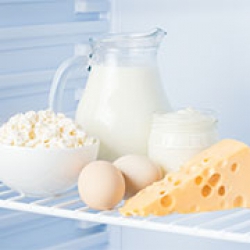Nutritional values
Entremont invites you to learn more about the nutritional values and benefits of its cheeses.
Cheese, an ally of anyone who is lactose intolerant.

Pressed cheeses (which include emmental, comté, gruyère and others) are naturally lactose-free. The lactose is broken down during the production process (maturing, draining).
People who are lactose-intolerant should, therefore, be encouraged to eat lactose-free cheese, an important source of calcium and proteins. In a diet, totally excluding or reducing dairy products can expose lactose-intolerant people to a risk of calcium deficiency which could subsequently have an impact on their bone health.
Cheese, a source of pleasure and vitality for older people

With flavours that reflect their region of origin and so many different textures, our cheeses are the perfect ingredient for stimulating your taste buds and your appetite! Entremont offers an exciting range of cheeses: there’s a variety to enjoy whatever your fancy.
Naturally rich in calcium and in proteins, our cheeses also meet your specific needs. Proteins contribute to building your muscle mass while calcium will help maintain your bone density. One 30 g portion of Emmental will provide up to ~465 kJ (112 kcal) of energy. Recommended intake for an average adult: 8,400 kJ/2,000 kcal.
Athletes, looking for gratification after exertion? Cheese is the answer!

Athletes need proteins that are important and essential for protecting muscle fibres (endurance sports) and increasing muscle mass (strength athletics). Our cheeses are naturally rich in proteins. A 30 g portion of Emmental provides 8.4 g of proteins, which is the equivalent found in about 50 g of meat or fish!
Cheese, an essential component in a balanced and varied diet... for everyone!

Dairy products, such as cheese, are the main source of the calcium our body needs. For adults, calcium contributes to maintaining a normal bone density. Our cheeses, naturally rich in calcium, are therefore important components of a balanced and varied diet—and are delicious to boot !
Cheese, a gold mine of calcium for kids

To protect our health, the National Health and Nutrition Programme (PNNS) in France recommends eating three dairy products a day (up to four for children, teenagers and the over 55s). Dairy products are a main source of calcium, a vital mineral for growth and increasing bone density at every stage of our lifetime.
During growth (from birth to the age of 18-20), a good calcium intake is essential to strengthen an individual’s bone mass. Our cheeses, naturally rich in calcium, thus contribute to providing a proportion of the calcium your children need. A 30 g portion of Emmental provides up to 37.5% of the recommended daily intake!
Cheese, a mine of calcium for you and your baby.... for pregnant and nursing women

The recommended intake of calcium increases during pregnancy and when breast-feeding to protect your health and help your developing baby build strong bones and teeth. A 30 g portion of Emmental provides up to 37.5% of the recommended daily intake. Whatever your fancy, there’s a variety for you, so feel free to mix them up!
Important : To prevent listeria during pregnancy, pregnant women are advised to consume only cooked pressed cheeses (such as Abondance, Beaufort, Emmental, Comté and Gruyère) with the rind removed. Pregnant women should, of course, avoid unpasteurised cheeses.
Did you know? The harder the cheese, the higher the calcium content: emmental contains up to 1,000 mg of calcium per 100 g!

Share